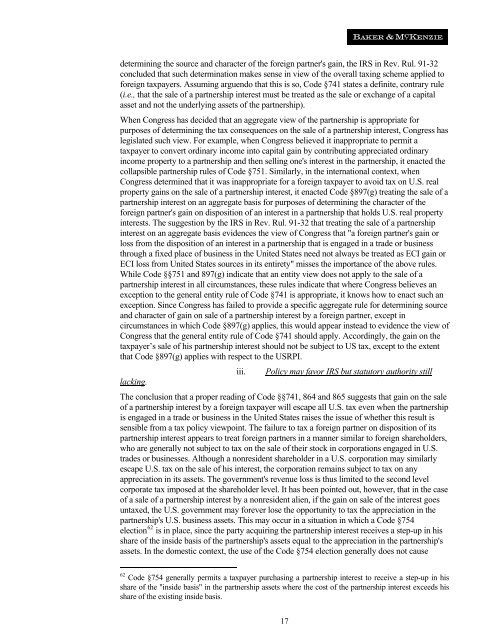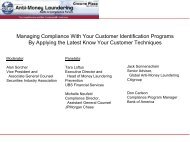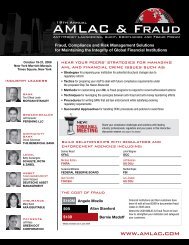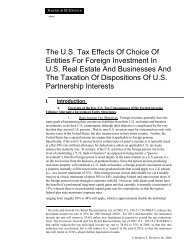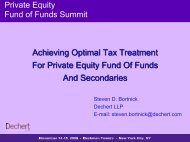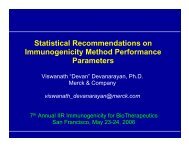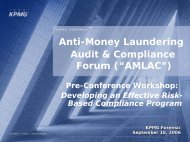The US Tax Effects Of Choice Of Entities For Foreign Investment - IIR
The US Tax Effects Of Choice Of Entities For Foreign Investment - IIR
The US Tax Effects Of Choice Of Entities For Foreign Investment - IIR
Create successful ePaper yourself
Turn your PDF publications into a flip-book with our unique Google optimized e-Paper software.
determining the source and character of the foreign partner's gain, the IRS in Rev. Rul. 91-32<br />
concluded that such determination makes sense in view of the overall taxing scheme applied to<br />
foreign taxpayers. Assuming arguendo that this is so, Code §741 states a definite, contrary rule<br />
(i.e., that the sale of a partnership interest must be treated as the sale or exchange of a capital<br />
asset and not the underlying assets of the partnership).<br />
When Congress has decided that an aggregate view of the partnership is appropriate for<br />
purposes of determining the tax consequences on the sale of a partnership interest, Congress has<br />
legislated such view. <strong>For</strong> example, when Congress believed it inappropriate to permit a<br />
taxpayer to convert ordinary income into capital gain by contributing appreciated ordinary<br />
income property to a partnership and then selling one's interest in the partnership, it enacted the<br />
collapsible partnership rules of Code §751. Similarly, in the international context, when<br />
Congress determined that it was inappropriate for a foreign taxpayer to avoid tax on U.S. real<br />
property gains on the sale of a partnership interest, it enacted Code §897(g) treating the sale of a<br />
partnership interest on an aggregate basis for purposes of determining the character of the<br />
foreign partner's gain on disposition of an interest in a partnership that holds U.S. real property<br />
interests. <strong>The</strong> suggestion by the IRS in Rev. Rul. 91-32 that treating the sale of a partnership<br />
interest on an aggregate basis evidences the view of Congress that "a foreign partner's gain or<br />
loss from the disposition of an interest in a partnership that is engaged in a trade or business<br />
through a fixed place of business in the United States need not always be treated as ECI gain or<br />
ECI loss from United States sources in its entirety" misses the importance of the above rules.<br />
While Code §§751 and 897(g) indicate that an entity view does not apply to the sale of a<br />
partnership interest in all circumstances, these rules indicate that where Congress believes an<br />
exception to the general entity rule of Code §741 is appropriate, it knows how to enact such an<br />
exception. Since Congress has failed to provide a specific aggregate rule for determining source<br />
and character of gain on sale of a partnership interest by a foreign partner, except in<br />
circumstances in which Code §897(g) applies, this would appear instead to evidence the view of<br />
Congress that the general entity rule of Code §741 should apply. Accordingly, the gain on the<br />
taxpayer’s sale of his partnership interest should not be subject to <strong>US</strong> tax, except to the extent<br />
that Code §897(g) applies with respect to the <strong>US</strong>RPI.<br />
lacking.<br />
iii.<br />
Policy may favor IRS but statutory authority still<br />
<strong>The</strong> conclusion that a proper reading of Code §§741, 864 and 865 suggests that gain on the sale<br />
of a partnership interest by a foreign taxpayer will escape all U.S. tax even when the partnership<br />
is engaged in a trade or business in the United States raises the issue of whether this result is<br />
sensible from a tax policy viewpoint. <strong>The</strong> failure to tax a foreign partner on disposition of its<br />
partnership interest appears to treat foreign partners in a manner similar to foreign shareholders,<br />
who are generally not subject to tax on the sale of their stock in corporations engaged in U.S.<br />
trades or businesses. Although a nonresident shareholder in a U.S. corporation may similarly<br />
escape U.S. tax on the sale of his interest, the corporation remains subject to tax on any<br />
appreciation in its assets. <strong>The</strong> government's revenue loss is thus limited to the second level<br />
corporate tax imposed at the shareholder level. It has been pointed out, however, that in the case<br />
of a sale of a partnership interest by a nonresident alien, if the gain on sale of the interest goes<br />
untaxed, the U.S. government may forever lose the opportunity to tax the appreciation in the<br />
partnership's U.S. business assets. This may occur in a situation in which a Code §754<br />
election 62 is in place, since the party acquiring the partnership interest receives a step-up in his<br />
share of the inside basis of the partnership's assets equal to the appreciation in the partnership's<br />
assets. In the domestic context, the use of the Code §754 election generally does not cause<br />
62 Code §754 generally permits a taxpayer purchasing a partnership interest to receive a step-up in his<br />
share of the "inside basis" in the partnership assets where the cost of the partnership interest exceeds his<br />
share of the existing inside basis.<br />
17


